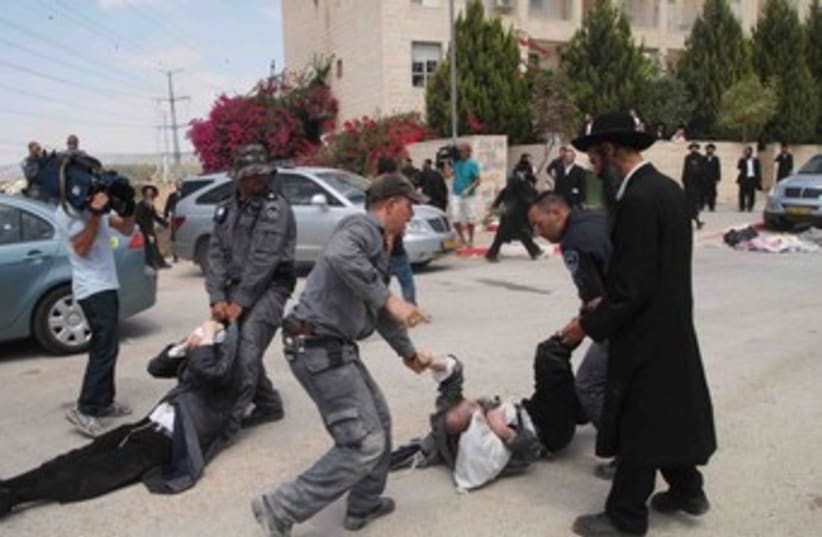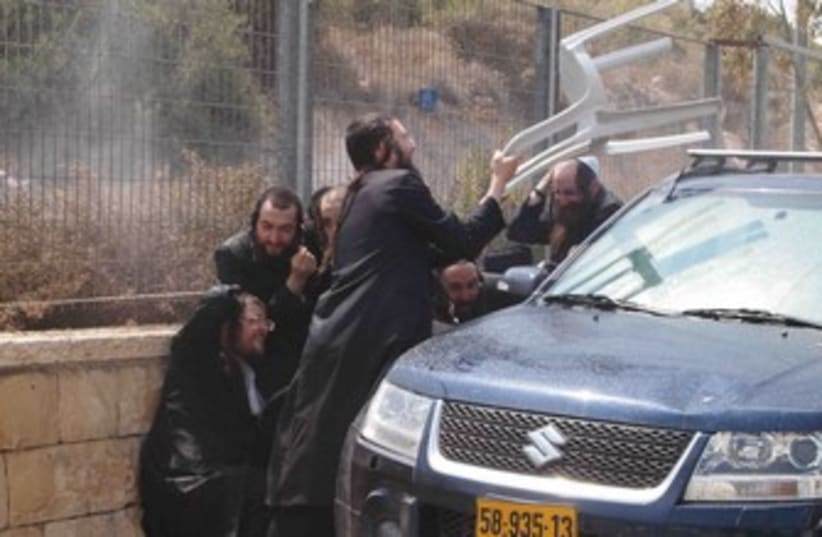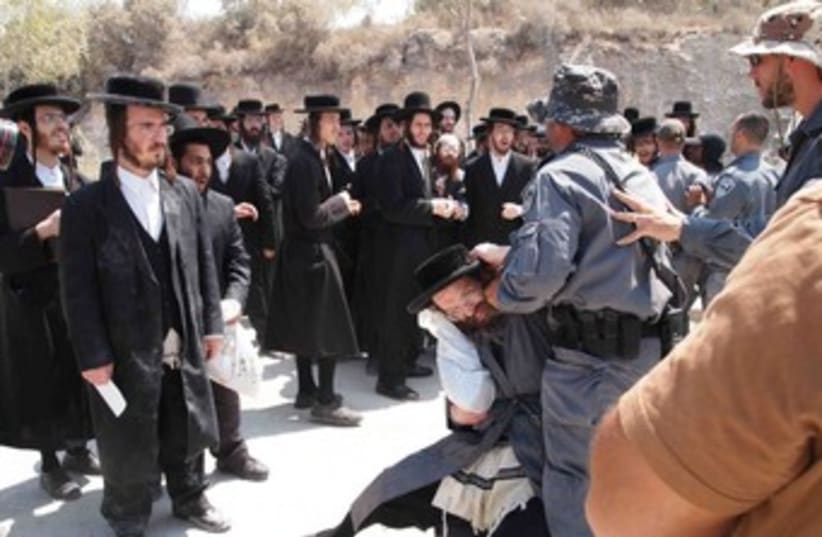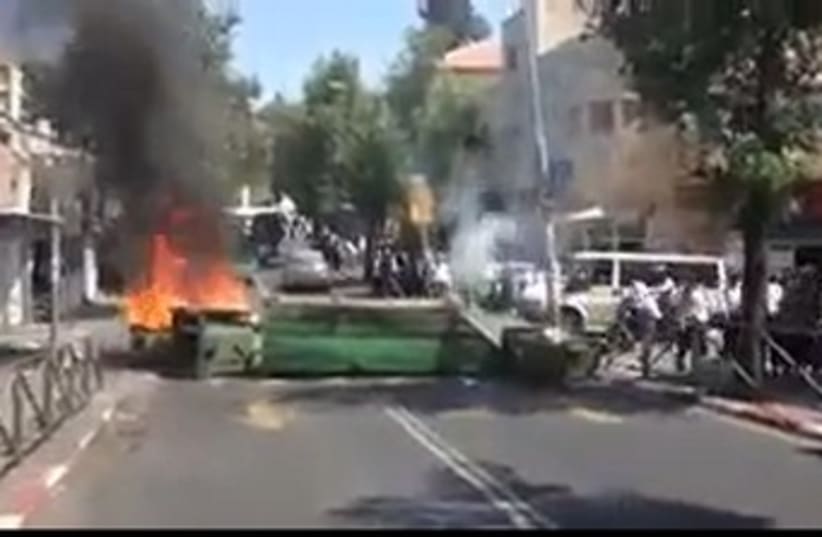



Haredi extremists rioted in Jerusalem and Beit Shemesh on Monday over what they viewed as the desecration of graves.The rioters, some of whom were affiliated with the Atra Kadisha, an organization dedicated to the preservation of ancient Jewish burial places, believe that there are hundreds of potentially Jewish graves at the Goloventzitz construction site in Ramat Beit Shemesh, where the new Ramat Avraham neighborhood is slated to be built.The police made 29 arrests during the riot in Beit Shemesh on charges of causing an affray, attacking police officers and lighting fires.One of those arrested was a minor. According to a police spokesman, several officers suffered minor injuries.In Jerusalem, several dozen haredi extremists took to the streets to protest the construction work in Beit Shemesh, and burned trash cans and dumpsters in the central Kikar Shabbat intersection of the Mea She’arim neighborhood, as well as on Malchei Yisrael and Yehezkel streets.Stones were thrown at buses passing through the neighborhood, breaking several windows. There were no arrests in Jerusalem, the police said.The Atra Kadisha claims it is forbidden under to Jewish law to open the graves and check if they are Jewish or not, and therefore other solutions need to be found.According to Yitzhak Weiss, a haredi journalist who identifies with Atra Kadisha, the organization suggested a plan whereby there would be certain structural changes made to the building, at a cost to those who bought apartments, in order to ensure that the graves were not harmed and to allow the construction to continue.Speaking to The Jerusalem Post, Ahrale Yakter, the director of a separate group called the Association for the Prevention of Grave Desecration, denied these claims and said that there was no reason one couldn’t carry out the necessary inspections to determine whether the graves were Jewish.He rejected the notion that such inspections would contravene Jewish law, and remarked that his organization had worked with building contractors around the country to solve such issues.Yakter cited the opinion of Rabbi Moshe Sternbuch – head of the Eda Haredit’s Rabbinical Court and the second- most senior figure in the hard-line organization – that it is permitted to check the graves.Last year, Sternbuch publicly criticized Atra Kadisha for protests at a separate site in Beersheba.The issue has divided the Eda Haredit, though, with Rabbi Yitzhak Tuvia Weiss, the overall head of the organization, ruling that the graves cannot be disturbed.Yanky Paley, a representative of the Agudat Eretz Hahayim organization – a competitor to the Atra Kadisha backed by Sternbuch that is engaged in overseeing the construction – told the Post that despite isolated incidents of protesters entering the Goloventzitz construction site, the work continued uninterrupted.Last week, several men associated with the Atra Kadisha severely beat property owner Aryeh Goloventzitz, according to a report on haredi news site Behadrei Haredim.Over 1,000 families will live in the Ramat Avraham neighborhood, Paley said, adding that “any place where we found holes dug in the ground was properly examined.”“In two years, there will be a nice neighborhood here and everyone will forget. The trees that were burned will regrow,” he said.The site, owned by the Goloventzitz brothers, is situated at the end of a deadend street, only one side of which is built up. Residents of the buildings overlooking the protest stared in shock as the hillside opposite their homes went up in flames. A police riot truck that had only moments before been holding back protesters now turned its attention to battling the flames until the fire department could arrive.As the neighborhood’s shopping center filled with smoke from the brush fire, students from a school down the road from the riots milled around, watching the flames across the street.The riot started around 7 a.m., local resident Ya’acov Lederman told the Post.Between 30 and 40 people showed up and stood at the fence surrounding the construction site.“As the guys were working, the protesters shouted, and from time to time tried to enter the site,” he said. “Little by little more arrived, some in cabs. They kept on trying to enter, but were always stopped.None of them entered the tractors.”According to participants, most of the rioters came from the more extreme Ramat Beit Shemesh Bet and Kirya Haredit neighborhoods.As the day progressed, more protesters arrived, eventually totaling more than 65. Occasionally one would make his way into the site and attempt to disrupt the work. At times, the crowd, yelling epithets, would surge forward, attempting to break through the line of police standing across the road between them and the site.People huddled behind cars and ran down the street to protect themselves from jets of high-pressure water from a riot truck, and two mounted police officers rode back and forth, relieving the pressure on their pedestrian counterparts.The police did not appear to be equipped with riot gear.“Nazis, go back to Germany,” some protesters screamed at the police, while others screamed that the officers were “stooges of the Zionist state.”“The state of Israel is impure, cursed be its name and its memory,” one man at the head of the crowd screamed.“We came because there are old graves and because according to Jewish law and the Sages, it is a great sin to damage graves and bones,” said Yosef Krozer, an elderly man who appeared to be one of the leaders of the protest.“There was a meeting of the Eda Haredit, and they decided that building here is forbidden,” he said.Asked if violence were an appropriate tool to achieve the Atra Kadisha’s goals, he replied that “it depends.” Sometimes, he mused, “it helps a lot.”Krozer said the police were acting “like murderers” and that while he didn’t “like to use the word Nazi to describe Jews... they are behaving like Nazis.”Local residents, however, disagreed with Krozer’s sentiments.Aron Solomon, a haredi man dressed in a blue shirt and carrying a smartphone, argued with the protesters, telling them that Sternbuch had authorized the construction.“We came to Ramat Beit Shemesh to live in peace with everyone, and the extremist groups who are causing so many problems have to be dealt with with all available strength,” he said. “We are against violence under any circumstances.”“Go back to Ramat Beit Shemesh Bet,” Ariel, another local, yelled at the protesters.“I think it’s really bad,” he told the Post. “It’s against the way of the Torah [to act like this]. There are normal people who want to go to the army, they want to live a normal life,” but the extremists are trying to enforce their way of life on us.”Several other residents echoed Ariel’s sentiments, telling the Post that they wanted the protesters out immediately.One man, who asked not to be named, grumbled that the protesters “come into our neighborhood, a neighborhood of people who work with the Internet, people who work for their livelihood, and they tell us... this area is ours. They should go back to the Kirya Haredit and Mea She’arim. We have no connection with them. They disrupt our lives and then yell at us.”Inside the construction site, private security guards hustled two infiltrators past tractors and made them sit on the ground. One of the guards placed a cardboard box on the head of one of the haredim until instructed to remove it by the police.After being hustled back out onto the street, one of the protesters spoke with the Post, stating that he “saw tractors digging without fear of getting to the graves of our fathers and shattering the bones.”“I was shocked,” he said. “I just went under the tractors until a few people carried me while beating me. They took me and threatened to take me to a torture chamber until they took me out.”The riot is a “police matter [and] not a municipal one,” said Matityahu Rosenzweig, the spokesman for Beit Shemesh Mayor Moshe Abutbol. The mayor, he said, calls on the police “to enforce the law and maintain public order and to show zero tolerance for violence.”Yesh Atid MK Dov Lipman, a resident of Beit Shemesh, condemned the violence, telling the Post that “these extremists cause nothing but damage to Judaism and religion,” and applauding the police for their strong showing against the rioters.“Over the years, [extremists] have learned that they can achieve their goals through violence,” Lipman said. “Well, there is a new sheriff in town, and we will not allow them to have any control – not in Beit Shemesh and not in the rest of the country.”The Yesh Atid MK expressed hope that “their anti-Jewish and anti-God activities will continue to backfire against them.”Lahav Harkov contributed to this report
